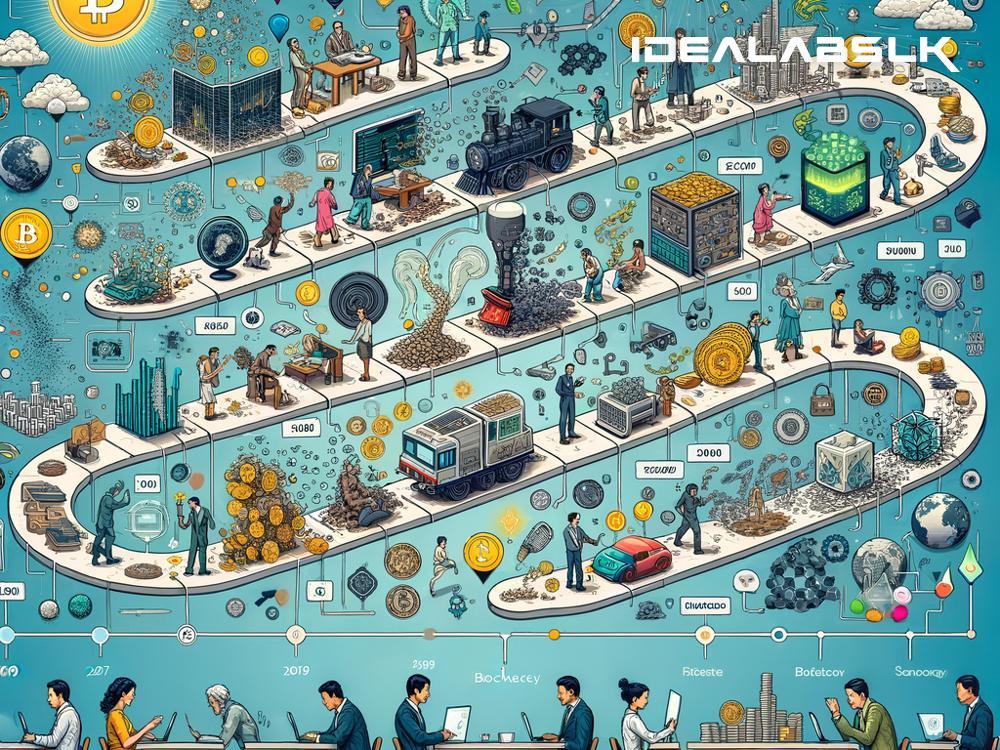The Unlikely Journey of Blockchain: From Bitcoin to Revolutionizing Our World
In the vast expanse of the internet, technologies come and go, but a few, like the blockchain, not only stay but revolutionize our perception of digital trust and security. The story of blockchain is closely tied to the tale of Bitcoin, the digital currency that introduced us to a decentralized way of handling financial transactions. But as we'll discover, blockchain's journey didn't stop there. This technology has burst from its financial cocoon to transform various sectors, showing us the power of innovation and trust in the digital age.
The Dawn of Blockchain and Bitcoin
The year was 2008, and the world was knee-deep in financial turmoil. Amidst this chaos, an individual (or perhaps a group) under the pseudonym Satoshi Nakamoto introduced Bitcoin and its underlying technology, blockchain, through a whitepaper. This wasn't just a new type of digital currency; it was a revolutionary way to conduct transactions without the need for a central authority.
Imagine a ledger that is open for everyone to see, yet secure and tamper-proof. That’s blockchain for you. Information is stored in blocks, and each block is connected to the one before and after it, creating a chain of blocks - hence, blockchain. This structure makes altering any information nearly impossible without alerting the entire network.
Initially, blockchain's role was to serve as the backbone for Bitcoin, ensuring secure, transparent, and decentralized transactions. However, the potential of blockchain was too vast to be contained within the realm of cryptocurrencies alone.
Beyond Bitcoin: Blockchain’s Diverse Applications
As blockchain technology matured, its potential applications began to unfold. Various industries started to see how blockchain could solve long-standing issues related to trust, transparency, and efficiency. Here are a few sectors where blockchain has made significant inroads:
-
Supply Chain Management: Products often travel through a long chain of manufacturers, shippers, and retailers before reaching consumers. Blockchain provides a way to securely and transparently track the journey of products, from factory to shelf, ensuring authenticity and reducing the chances of counterfeit goods.
-
Healthcare: Patient data is sensitive and requires the highest level of security and privacy. Blockchain offers a solution by enabling secure and immutable storage of medical records, granting access only to authorized individuals. This not only protects patient privacy but also facilitates the safe, efficient sharing of data among healthcare providers.
-
Voting Systems: The integrity of elections is paramount to democracy. Blockchain can be employed to create tamper-proof voting systems, where votes are recorded securely and transparently, potentially reducing the risk of fraud and ensuring the legitimacy of election results.
-
Smart Contracts: These are self-executing contracts with the terms of the agreement directly written into code. Utilized in various fields, from real estate to legal processes, smart contracts automate and enforce contract conditions, significantly reducing the need for intermediaries and making transactions speedier and more cost-effective.
Challenges and the Future
Despite its many applications and benefits, blockchain is not without its challenges. Issues such as scalability, energy consumption (particularly with cryptocurrencies like Bitcoin), and regulatory uncertainties need addressing for blockchain to reach its full potential. However, the continuous advancement in technology and the increasing collaboration between tech communities and regulators paint a promising future.
Moreover, as people become more conscious of privacy and data security, the demand for technologies offering solutions to these concerns grows, positioning blockchain as a critical player in the future of secure, decentralized digital transactions.
In Conclusion
From Satoshi Nakamoto's whitepaper to a technology shaping the future of various industries, blockchain has indeed come a long way. Its journey from underpinning Bitcoin to its broader applications illustrates the immense possibilities when innovation meets market needs. As we continue to explore and expand blockchain technology, it's clear that its story is just beginning. In this era of digital transformation, blockchain stands as a testament to the power of decentralized security and trust, promising a more transparent, efficient, and secure world.
The history of blockchain is not just a story of technological evolution; it is a narrative about the relentless quest for a more transparent and trustworthy digital society. As we step into the future, the legacy of blockchain continues to unfold, paving new paths and enlightening us on the endless possibilities of the digital age.

